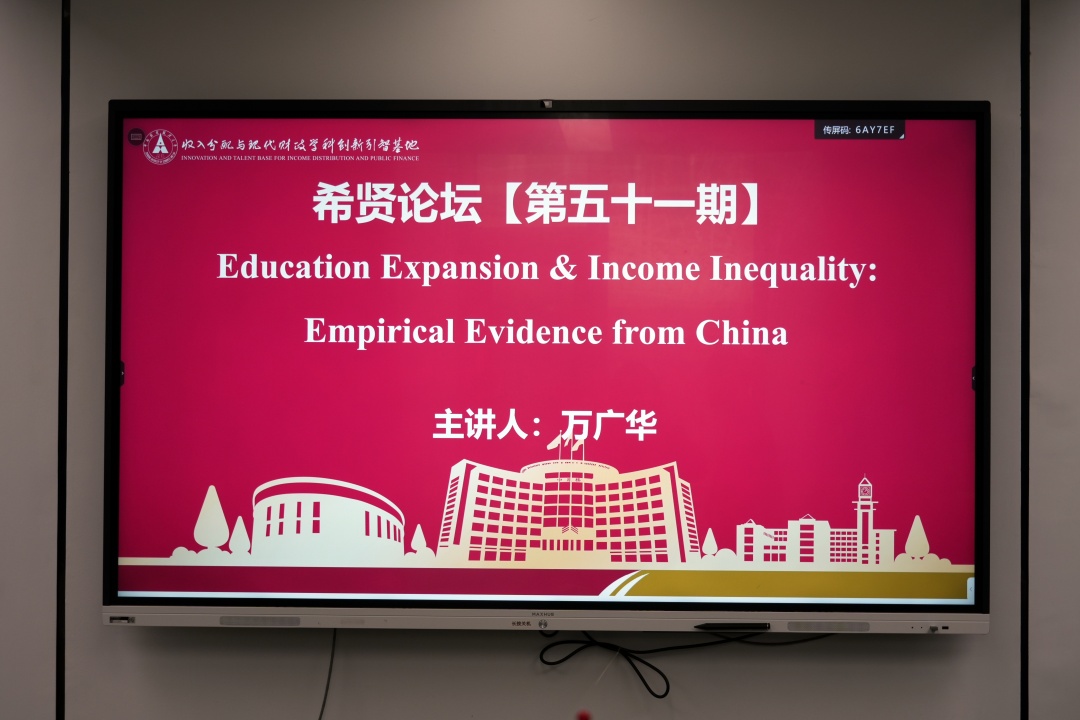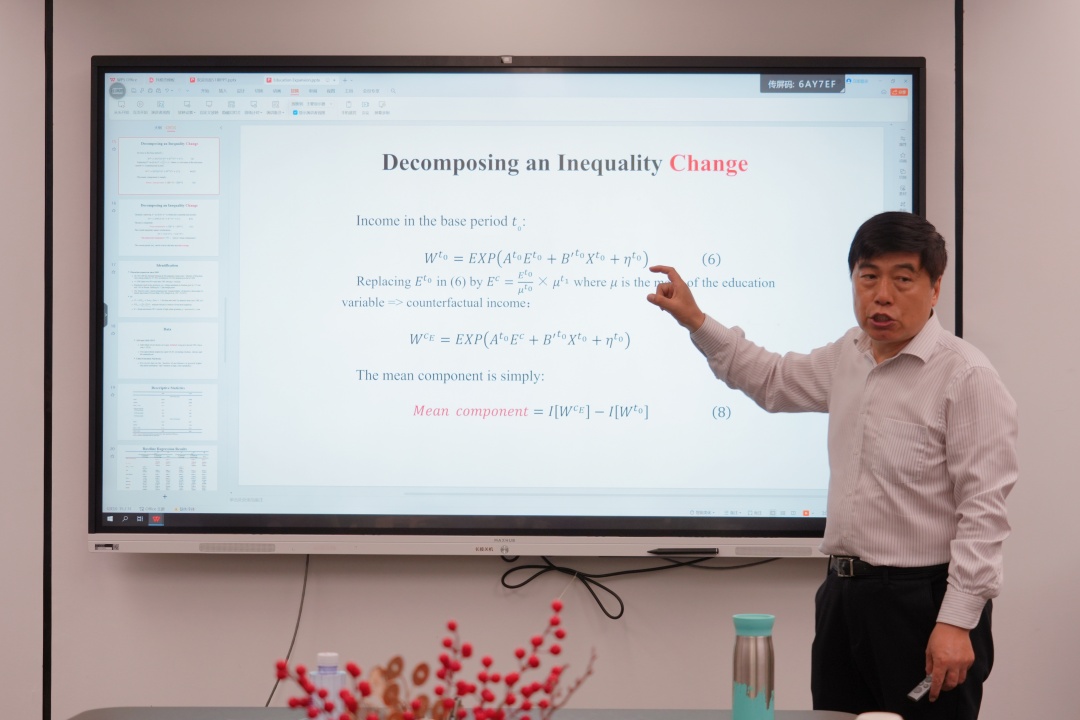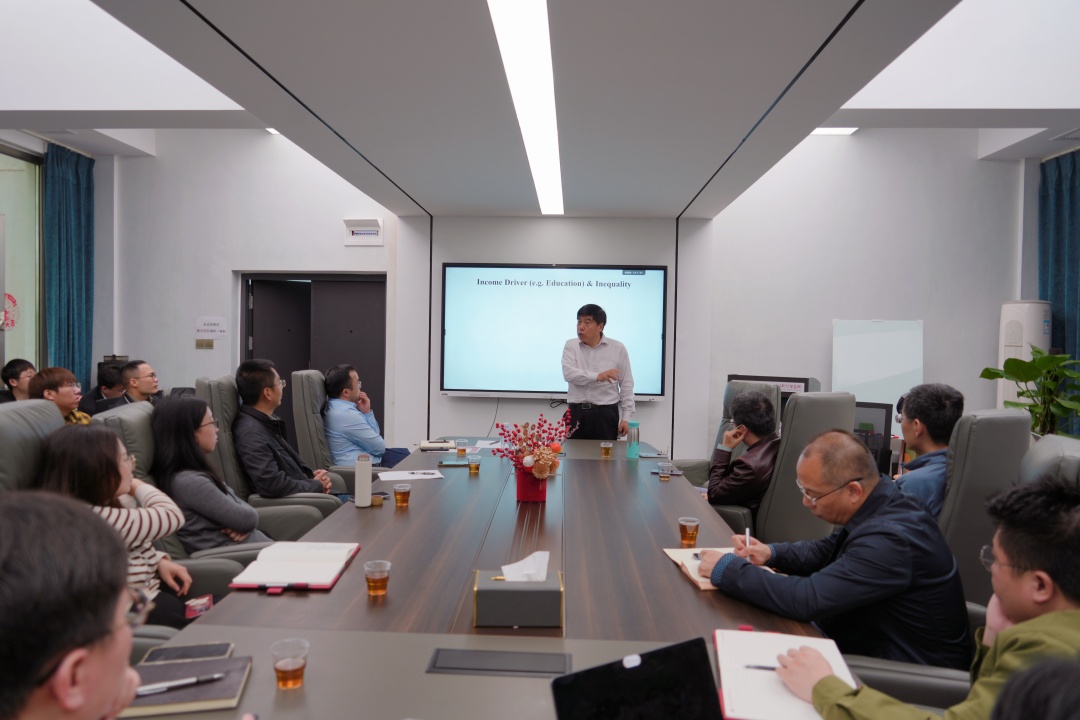The 51st Xi Xian Forum, co-hosted by the Institute of Income Distribution and Public Finance (IIDPF) and the School of Public Finance and Taxation, was successfully held on April 10, 2024 in Conference Room 119 of Wenqin Building. Professor Wan Guanghua, Director of the Institute of World Economy of Fudan University, was the keynote speaker of the forum and gave a keynote speech entitled "Education Expansion & Income Inequality: Empirical Evidence from China". The academic forum was chaired by Professor Lu Yuanping, Executive Director of IIDPF, with the participation of Professor Ma Yuanyuan, Associate Professor Zhao Ying, Associate Professor Wan Xin and Associate Professor Yan Weibo from the School of Public Finance and Taxation, and over 30 faculty members and students, including researchers Dr Wan Qian, Dr Zou Wei, Dr Li Shanshan, and Assistant Professor Gao Sihan from IIDPF.

The increasing inequality has undermined economic growth, social cohesion, political stability, globalization, and other aspects. Education has long been perceived as a powerful equalizer. Nonetheless, despite the global increase in years of schooling, income inequality persists and intensifies. Professor Wan Guanghua and other scholars proposed a method to decompose the contribution of variables to the changes in inequality into average values, dispersion, and prices. They utilized this method to study the role of educational variables in the decline of wage inequality in China from 2010 to 2018. The research findings indicate that education can be a powerful equalizer, but this does not mean neglecting the different components of education-driven inequality in a general sense. In most cases, educational expansion is manifested by an increase in the average years of schooling. However, as discussed in the article, this may exacerbate inequality. Furthermore, educational expansion is accompanied by a simultaneous decrease in its dispersion degree, so attention cannot be solely paid to the increase in average years of schooling. It is crucial to achieve a more equitable education. This can be achieved by prioritizing the provision of assistance and opportunities to rural areas, impoverished individuals, marginalized groups, and vulnerable populations in China.

Professor Wan Guanghua brought a wonderful lecture to the faculty members and students present while also triggering deep contemplation among them. During the discussion session, the faculty members and students spoke up enthusiastically, engaging in active interactive exchanges on topics such as research background, theoretical model and demonstration.

Introduction to the keynote speaker:
Wang Guanghua is a renowned economist, distinguished second-level professor of Fudan University and director of the Institute of World Economy of Fudan University. He is also a former senior official of the United Nations and Asian Development Bank. He is ranked among the top 6% economists globally and the top 3% in Asia by RePEc (IDEAS personal ranking compilation) and included in Who's Who in the World several times. He was the earliest to propose that "issues relating to agriculture, rural areas and the wellbeing of farmers" need to be solved in urban areas (from 2006 to 2008); and that China's urbanization is the only way to address poverty and income gap (from 2006 to 2008). He also predicted that China's international development environment will become increasingly severe (from 2009 to 2010). Professor Wang Guanghua has published over 300 academic papers and think tank research results in both Chinese and English, and authored more than 10 monographs (including publications from Oxford University Press, Macmillan Publishers, Sanlian Publishing House, and Social Sciences Literature Press). Among them, he has published 23 Chinese papers on Economic Research Journal, 4 on Social Sciences in China, 8 on Management World, and 7 on China Economic Quarterly. He serves as an editorial board member and guest editor for over 20 authoritative economics journals both domestically and internationally, including the Economic Research Journal. He was awarded the "Best Paper" by ANBAR Electronic Intelligence, and has won many provincial and ministerial research awards such as the "Zhang Peigang Outstanding Achievement Award in Development Economics".
